|
From the Dean
 In an interview I did recently with a member of the agricultural press, the reporter wanted to talk about funding for agricultural research. One of the questions she asked was “why is agricultural research important in Indiana?” Of course, I believe agricultural research is of fundamental importance to our state, but a basic question like this one forced me to think about some of the specific reasons why that is true. Let me offer a few thoughts in this month’s column. In an interview I did recently with a member of the agricultural press, the reporter wanted to talk about funding for agricultural research. One of the questions she asked was “why is agricultural research important in Indiana?” Of course, I believe agricultural research is of fundamental importance to our state, but a basic question like this one forced me to think about some of the specific reasons why that is true. Let me offer a few thoughts in this month’s column.
Certainly one reason is the need to increase agricultural productivity. Feeding a growing world population will mean states such as Indiana that are blessed with productive soils and adequate rainfall will be called on to produce more. We conduct more than 400 research studies annually at our Purdue Ag Centers, many of which are aimed at helping Indiana farmers improve yield. Our work in this area is both broad and deep, and Purdue Agriculture research in genetics, plant biology, soil chemistry, and sensor and GIS technology, along with many more advances from laboratory and field research, help Indiana farmers grow more.
Of course, Indiana also needs agricultural research simply to hold current levels of productivity. Farming is a continual tug-of-war with Mother Nature as pests, diseases and weeds develop tolerance to management products, bacteria become resistant to antibiotics, and so on. Faculty members such as Bill Johnson and Kiersten Wise conduct field research on disease management and weed control, helping farmers identify effective products and practices. Linda Prokopy leads a very large multi-state project focused on helping farmers better manage our increasingly variable weather.
We all know that agriculture’s challenge is no longer just about producing more, it is about producing more while managing our environmental footprint; it is about producing more in a manner society deems acceptable; it is about producing more and using fewer resources. Here, our researchers work to assess and improve the environmental health of water and soil, help producers responsibly manage animal waste and maintain the quality of ground and well water. We are a partner (with the College of Veterinary Medicine and the Agricultural Research Service’s Livestock Behavior Research Unit) on the new Center for Animal Welfare Science, which will help bring science into the debate over responsible food animal production.
Purdue Agriculture research is also about helping identify new business opportunities in the state. For example, energy costs are a big issue affecting the potential for off-season vegetable production to take advantage of the growing market for local produce. People such as Cary Mitchell are looking at new methods of LED lighting in greenhouses to cut energy costs. Work being done at our Purdue Agricultural Centers focuses on the use of high tunnel greenhouses to extend the growing season, which can open up new markets. Maria Marshall’s research focuses on helping rural communities take advantage of new opportunities through small business development and more effective family business management.
Our basic research provides the foundation for innovation and commercialization in the state. Many firms have moved from a strategy of ‘research and develop’ to a strategy of ‘acquire and develop’. Indiana companies work with our researchers to answer some of the most fundamental questions about how plants and animals grow. Researchers such as Jian-Kang Zhu are working to improve how crops resist environmental challenges and respond to adverse environmental conditions. This year’s Ag Research Award winner, Shihuan Kuang, studies muscle growth and development, adult stem cell biology and neuromuscular diseases, and his research has application in both the animal agricultural industry and in human health. As the state of Indiana moves forward with the Indiana Food and Agriculture Innovation Initiative, Purdue Agriculture research will certainly be a key player.
The safety of the food we grow and eat, as well as protecting and improving our health, are concerns of Hoosier producers and consumers. Several researchers across the College work on food safety issues: Haley Oliver helped melon producers prepare for federal inspections of their operations following instances of Salmonella traced to cantaloupes from a southern Indiana farm in 2012 and Paul Ebner’s recent work has shown that treating food products with select bacteriophages—viruses that target and kill bacteria—could significantly reduce concentrations of E. coli in our food supply.
Purdue Agriculture research is also focused on protecting our water, effectively managing our Indiana forests, preserving habitat for Indiana wildlife and generally working to enhance our state’s natural resources. Researchers such as Marisol Sepulveda focus on measuring contaminants in our lakes and streams; Rod Williams works on helping protect the rare Hellbender salamander; and Indrajeet Chaubey has worked on strategies for reducing runoff into watersheds.
Purdue Agriculture researchers address important public policy issues in Indiana. Faculty such as Janet Ayres study rural change, residents' attitudes toward agriculture and controversial issues such as CAFOs, and help develop processes that bring people together to establish communication, build relationships, manage conflict, and create innovative ways to move forward.
Frankly, I could just keep going. The bottom-line is that Indiana agriculture is at the center of some of the most pressing issues that we as a society face: feeding a growing population, addressing climate change and environmental issues, providing renewable sources of energy, insuring food safety, and stewarding our natural resources. Many, many faculty, staff, and students across Purdue Agriculture conduct research that directly benefits our state: fostering economic development, enhancing our environment, and improving the quality of life. Purdue Agriculture research makes a real difference in Indiana.
All the best,

|
|
Purdue Agriculture People
|
Graduate Research Spotlight: Celina Gomez Vargas
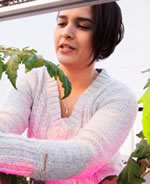 The Graduate Research Spotlight highlights graduate students and their work. This month’s spotlight is on Celina Gomez Vargas, Horticulture; advisor Cary Mitchell. The Graduate Research Spotlight highlights graduate students and their work. This month’s spotlight is on Celina Gomez Vargas, Horticulture; advisor Cary Mitchell.
Full story: https://ag.purdue.edu/arp/Pages/SpotlightVargas.aspx#.U0bVefldV8E
Message from the Dean on Spring Fest
Once again, Purdue's premier outreach event was a resounding success! Spring Fest seems to get better every year, and the work of many, many students, staff and faculty to make it all happen is deeply appreciated. A huge thanks to Engagement Program Manager Danica Kirkpatrick! She makes managing the incredible number of details and volunteers involved in Spring Fest look easy. Danica's student intern, Cora Carter, showed outstanding leadership in running the event on Saturday.
In walking around the sites, I was reminded how dedicated our students are and how enthusiastic they are about Purdue.The work they had done planning their exhibits/educational activities and the passion they have for their work were evident. Just walking through the event and seeing younger children literally everywhere reminds us all of why we do Spring Fest. I am quite sure that we have some future animal scientists, entomologists, food scientists, economists, biochemists, agronomists, wildlife experts, foresters, horticulturalists, agricultural educators, ag engineers, plant biologists, farmers, and…. in the group. Again, thanks to everyone who put in so much time and effort to make something very special happen for the College, the University, and the community.
Purdue students show how to innovate with soybeans
 A group of Purdue University students who created a soy-based, renewable and recyclable filament for 3D printing won the top prize in the annual Student Soybean Product Innovation Contest. The awards were announced at a reception on March 26 in Indianapolis. A record 15 teams completed projects in the competition, which is celebrating its 20th anniversary. The runner-up team, Soots, produced a 100 percent organic leather boot conditioner and polish by the same name. The product comes in two forms: One, made from soybean oil and beeswax, is a thick, more solid polish for genuine leather such as boots and reins and also serves as a waterproofing agent. Soots team members are Sean Anderson of Churubusco, Ind., a junior in forestry; his brother, Evan, a sophomore in agricultural engineering; and Sara Richert of Oak Park, Ill., a sophomore in agricultural engineering. A group of Purdue University students who created a soy-based, renewable and recyclable filament for 3D printing won the top prize in the annual Student Soybean Product Innovation Contest. The awards were announced at a reception on March 26 in Indianapolis. A record 15 teams completed projects in the competition, which is celebrating its 20th anniversary. The runner-up team, Soots, produced a 100 percent organic leather boot conditioner and polish by the same name. The product comes in two forms: One, made from soybean oil and beeswax, is a thick, more solid polish for genuine leather such as boots and reins and also serves as a waterproofing agent. Soots team members are Sean Anderson of Churubusco, Ind., a junior in forestry; his brother, Evan, a sophomore in agricultural engineering; and Sara Richert of Oak Park, Ill., a sophomore in agricultural engineering.
Full story: http://www.purdue.edu/newsroom/releases/2014/Q1/purdue-students-show-how-to-innovate-with-soybeans.html
Spring Learning from Leaders Program set
 Faculty, staff and students are invited to join us for the Spring 2014 Learning from Leaders talk presented by Michele Payn-Knoper on Tuesday, April 15 at 6:00 pm in the Pfendler Hall Deans Auditorium. Michele Payn-Knoper, CSP, connects farm gate to food plate to your fork as principal of Cause Matters Corp. She is known for being a community catalyst and a passionate advocate for overcoming food misinformation—and for antagonizing people into action. Michele has worked in more than25 countries and raised more than $5 million in sponsorships for the National FFA Foundation. She is the founder of the weekly online Twitter conversations AgChat and FoodChat, which have involved more than 15,000 participants since April 2009. Payn-Knoper has earned the Certified Speaking Professional (CSP) designation, awarded to less than 10% of professional speakers globally. She holds degrees in animal science and agricultural communications from Michigan State University. She resides with her daughter in rural Indiana where they garden, cook, and enjoy fun with friends. Michele serves as a resource to connect conversations around the food plate at http://causematters.com. Faculty, staff and students are invited to join us for the Spring 2014 Learning from Leaders talk presented by Michele Payn-Knoper on Tuesday, April 15 at 6:00 pm in the Pfendler Hall Deans Auditorium. Michele Payn-Knoper, CSP, connects farm gate to food plate to your fork as principal of Cause Matters Corp. She is known for being a community catalyst and a passionate advocate for overcoming food misinformation—and for antagonizing people into action. Michele has worked in more than25 countries and raised more than $5 million in sponsorships for the National FFA Foundation. She is the founder of the weekly online Twitter conversations AgChat and FoodChat, which have involved more than 15,000 participants since April 2009. Payn-Knoper has earned the Certified Speaking Professional (CSP) designation, awarded to less than 10% of professional speakers globally. She holds degrees in animal science and agricultural communications from Michigan State University. She resides with her daughter in rural Indiana where they garden, cook, and enjoy fun with friends. Michele serves as a resource to connect conversations around the food plate at http://causematters.com.
2014 TEAM Award winner announced
This year's TEAM Award winner is the Center for Direct Catalytic Conversion of Biomass to Biofuels (C3Bio) Team. Faculty and staff are invited to celebrate with the team during a presentation and reception on Monday, May 12 at 2:00 p.m. in the Pfendler Hall Deans Auditorium. C3Bio integrates plant genetics, molecular biology, cutting-edge catalysis, analytical chemistry, and multi-scale imaging and engineering to directly convert non-food plant biomass to transportation fuels and other value-added products.
More information: http://www.agriculture.purdue.edu/in_focus/2014/April/2014TEAMAward.pdf
|
|
Awards and Recognitions
 Three Agriculture faculty members have been selected as University Faculty Scholars for 2014: Mario Ferruzzi, Food Science, Barbara Golden, Biochemistry and Guri Johal, Botany and Plant Pathology. The University Faculty Scholars Program recognizes outstanding faculty members at the West Lafayette campus who are on an accelerated path for academic distinction in the discovery and dissemination of knowledge. The long-term goal of Dr. Ferruzzi's research is to identify food science strategies that will contribute to the prevention of chronic disease in humans. Dr. Golden's research program has provided important new insights into the catalytic capability of RNAs. Dr. Johal's research has had a huge impact in maize genetics and on basic mechanisms of plant disease and insect resistance. Three Agriculture faculty members have been selected as University Faculty Scholars for 2014: Mario Ferruzzi, Food Science, Barbara Golden, Biochemistry and Guri Johal, Botany and Plant Pathology. The University Faculty Scholars Program recognizes outstanding faculty members at the West Lafayette campus who are on an accelerated path for academic distinction in the discovery and dissemination of knowledge. The long-term goal of Dr. Ferruzzi's research is to identify food science strategies that will contribute to the prevention of chronic disease in humans. Dr. Golden's research program has provided important new insights into the catalytic capability of RNAs. Dr. Johal's research has had a huge impact in maize genetics and on basic mechanisms of plant disease and insect resistance.
 Natalia Dudareva, professor of biochemistry, has been selected to receive the 2014 Sigma Xi Research Award. The award, presented by the Purdue chapter of Sigma Xi, a non profit membership society of scientists and engineers, honors a faculty member for outstanding research. Natalia was honored at the Sigma Xi Banquet on April 2nd and will be invited to present the Sigma Xi Faculty Research Lecture next academic year. Natalia Dudareva, professor of biochemistry, has been selected to receive the 2014 Sigma Xi Research Award. The award, presented by the Purdue chapter of Sigma Xi, a non profit membership society of scientists and engineers, honors a faculty member for outstanding research. Natalia was honored at the Sigma Xi Banquet on April 2nd and will be invited to present the Sigma Xi Faculty Research Lecture next academic year.
 Bruce Hamaker, Distinguished Professor and Roy Whistler Chair in food science, has been elected a Fellow in the Institute of Food Technologists. The recognition is given to a select group of distinguished scientists whose work has significantly impacted food science and/or the food industry. Bruce has been a research leader in carbohydrate chemistry, functionality, and its relation to health for many years. Bruce Hamaker, Distinguished Professor and Roy Whistler Chair in food science, has been elected a Fellow in the Institute of Food Technologists. The recognition is given to a select group of distinguished scientists whose work has significantly impacted food science and/or the food industry. Bruce has been a research leader in carbohydrate chemistry, functionality, and its relation to health for many years.
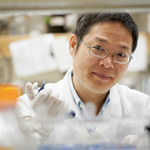 Shihuan Kuang, associate professor of animal sciences, has been selected to receive the 2014 Purdue University Agricultural Research Award. This is the highest honor awarded by Ag Research at Purdue to mid-career faculty members and reflects his contribution to stem cell biology and regulation of these fundamental units in muscle and adipose tissues. His ground-breaking research has high relevance to food animal agriculture as well as human health. Dr. Kuang will present the Ag Research Award lecture, “Muscle-fat crosstalk and its implications in animal growth and human health”, on Wednesday, May 7 at 3:30 pm in the Pfendler Hall Deans Auditorium. Shihuan Kuang, associate professor of animal sciences, has been selected to receive the 2014 Purdue University Agricultural Research Award. This is the highest honor awarded by Ag Research at Purdue to mid-career faculty members and reflects his contribution to stem cell biology and regulation of these fundamental units in muscle and adipose tissues. His ground-breaking research has high relevance to food animal agriculture as well as human health. Dr. Kuang will present the Ag Research Award lecture, “Muscle-fat crosstalk and its implications in animal growth and human health”, on Wednesday, May 7 at 3:30 pm in the Pfendler Hall Deans Auditorium.
Lisa Mauer, professor of food science, has been selected to receive the Institute of Food Technologists' Marcel Loncin Research Prize in support of her research on water-solid interactions, physical structure of ingredients, and vitamin stability. This is the premier research recognition in her field.
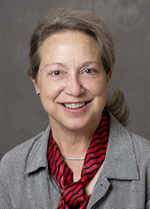 Suzanne Nielsen, professor of food science, has been named a recipient of the 2014 Charles B. Murphy Outstanding Undergraduate Teaching Awards. The University’s highest undergraduate teaching honor, the Murphy Award is accompanied by a $10,000 cash award and induction into Purdue’s Teaching Academy, which provides leadership for the improvement of undergraduate, graduate and outreach teaching. Murphy was a history professor at Purdue from 1927 to 1970. Since the inception of the award in 1967, only 206 faculty members have received the Murphy Award. Nielsen, who was the head of the Department of Food Science from 2002 to 2013, earned the department’s outstanding teaching award in 2013. Suzanne Nielsen, professor of food science, has been named a recipient of the 2014 Charles B. Murphy Outstanding Undergraduate Teaching Awards. The University’s highest undergraduate teaching honor, the Murphy Award is accompanied by a $10,000 cash award and induction into Purdue’s Teaching Academy, which provides leadership for the improvement of undergraduate, graduate and outreach teaching. Murphy was a history professor at Purdue from 1927 to 1970. Since the inception of the award in 1967, only 206 faculty members have received the Murphy Award. Nielsen, who was the head of the Department of Food Science from 2002 to 2013, earned the department’s outstanding teaching award in 2013.
 Michelle "Micky" Creech, Agricultural and Biological Engineering, received a "Thumbs Up" citation from Dean Jay Akridge: Michelle "Micky" Creech, program manager of the Purdue Student Soybean & Corn Innovation Competition, for pulling off an outstanding Student Soybean Product Innovation Contest on March 26. This is the 20th anniversary of the competition, and a record 15 teams of students completed projects. These teams of students from across the Purdue campus developed ideas for new products made from soybeans and competed for $30,000 in prize money. Micky recruits student teams, coordinates their participation in the competition and interacts with faculty advisors, all culminating in the Soybean & Corn Innovation reception and awards ceremony in Indianapolis at the Indiana Roof Ballroom and attended by a great group of College of Agriculture stakeholders. Her dedication and hard work made this a premier event for showcasing our Purdue students and their talent. Michelle "Micky" Creech, Agricultural and Biological Engineering, received a "Thumbs Up" citation from Dean Jay Akridge: Michelle "Micky" Creech, program manager of the Purdue Student Soybean & Corn Innovation Competition, for pulling off an outstanding Student Soybean Product Innovation Contest on March 26. This is the 20th anniversary of the competition, and a record 15 teams of students completed projects. These teams of students from across the Purdue campus developed ideas for new products made from soybeans and competed for $30,000 in prize money. Micky recruits student teams, coordinates their participation in the competition and interacts with faculty advisors, all culminating in the Soybean & Corn Innovation reception and awards ceremony in Indianapolis at the Indiana Roof Ballroom and attended by a great group of College of Agriculture stakeholders. Her dedication and hard work made this a premier event for showcasing our Purdue students and their talent.
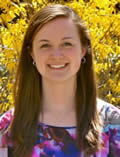 Emily Erickson, a junior majoring in biochemistry, is one of four Purdue students who have received Barry Goldwater Scholarships. The scholarship provides up to $7,500 toward tuition, fees, room and board. Congress established it in 1986 to provide a continuing source of highly qualified scientists, mathematicians and engineers by awarding scholarships to sophomores and juniors who intend to pursue research careers. Students studying in the science, engineering and mathematics fields are eligible. Congratulations also go to Sherry Pogranichniy, undergraduate program administrator in Biochemistry, whose son was also awarded a Goldwater Scholarship. Emily Erickson, a junior majoring in biochemistry, is one of four Purdue students who have received Barry Goldwater Scholarships. The scholarship provides up to $7,500 toward tuition, fees, room and board. Congress established it in 1986 to provide a continuing source of highly qualified scientists, mathematicians and engineers by awarding scholarships to sophomores and juniors who intend to pursue research careers. Students studying in the science, engineering and mathematics fields are eligible. Congratulations also go to Sherry Pogranichniy, undergraduate program administrator in Biochemistry, whose son was also awarded a Goldwater Scholarship.
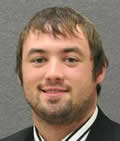 For the second year in a row, a team from Purdue University won a statewide business plan competition for clean energy startups and will compete in a regional competition in Chicago. Spero Energy Inc. won the Indiana Clean Energy Challenge in February and competed in the Midwest Clean Energy Challenge on April 3 in Chicago. The company's mission is to develop sustainable processes to create high-value flavor and fragrance chemicals from plant components. The Spero Energy team includes Barron B. Hewetson, a graduate research assistant in the Department of Agricultural and Biological Engineering; Trenton Parsell, post-doctorate researcher, Department of Chemistry; and Mahdi Abu-Omar, the R.B. Wetherill Professor of Chemistry and Chemical Engineering and associate director of Purdue's Center for Direct Catalytic Conversion of Biomass to Biofuels. For the second year in a row, a team from Purdue University won a statewide business plan competition for clean energy startups and will compete in a regional competition in Chicago. Spero Energy Inc. won the Indiana Clean Energy Challenge in February and competed in the Midwest Clean Energy Challenge on April 3 in Chicago. The company's mission is to develop sustainable processes to create high-value flavor and fragrance chemicals from plant components. The Spero Energy team includes Barron B. Hewetson, a graduate research assistant in the Department of Agricultural and Biological Engineering; Trenton Parsell, post-doctorate researcher, Department of Chemistry; and Mahdi Abu-Omar, the R.B. Wetherill Professor of Chemistry and Chemical Engineering and associate director of Purdue's Center for Direct Catalytic Conversion of Biomass to Biofuels.
|
|
Purdue Agriculture in the News
Discovery could yield more efficient plants for biofuels
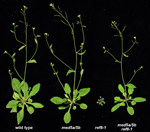 Genetically modifying a key protein complex in plants could lead to improved crops for the production of cellulosic biofuels, according to a study led by Clint Chapple, distinguished professor of biochemistry. He and fellow researchers generated a mutant Arabidopsis plant whose cell walls can be converted easily into fermentable sugars but does not display the stunted growth patterns of similar mutants. The finding could maintain yield while reducing the need for costly pretreatment processes that make cellulosic biofuels more inefficient to produce than corn ethanol. Genetically modifying a key protein complex in plants could lead to improved crops for the production of cellulosic biofuels, according to a study led by Clint Chapple, distinguished professor of biochemistry. He and fellow researchers generated a mutant Arabidopsis plant whose cell walls can be converted easily into fermentable sugars but does not display the stunted growth patterns of similar mutants. The finding could maintain yield while reducing the need for costly pretreatment processes that make cellulosic biofuels more inefficient to produce than corn ethanol.
Full story: http://www.purdue.edu/newsroom/releases/2014/Q1/discovery-could-yield-more-efficient-plants-for-biofuels.html
Landscape 'transition zones' may influence where tornadoes strike
 Areas where landscape shifts from urban to rural or forest to farmland may have a higher likelihood of severe weather and tornado touchdowns, a Purdue University study says. An examination of more than 60 years of Indiana tornado climatology data from the National Weather Service's Storm Prediction Center showed that a majority of tornado touchdowns occurred near areas where dramatically different landscapes meet - for example, where a city fades into farmland or a forest meets a plain. Forecasters and city planners may need to pay closer attention to these "transition zones" to better understand tornado risks, said Olivia Kellner, doctoral student in the Department of Earth, Atmospheric and Planetary Sciences and first author of the study. Dev Niyogi, Agronomy, co-authored the study. Areas where landscape shifts from urban to rural or forest to farmland may have a higher likelihood of severe weather and tornado touchdowns, a Purdue University study says. An examination of more than 60 years of Indiana tornado climatology data from the National Weather Service's Storm Prediction Center showed that a majority of tornado touchdowns occurred near areas where dramatically different landscapes meet - for example, where a city fades into farmland or a forest meets a plain. Forecasters and city planners may need to pay closer attention to these "transition zones" to better understand tornado risks, said Olivia Kellner, doctoral student in the Department of Earth, Atmospheric and Planetary Sciences and first author of the study. Dev Niyogi, Agronomy, co-authored the study.
Full story: http://www.purdue.edu/newsroom/releases/2014/Q2/landscape-transition-zones-may-influence-where-tornadoes-strike.html
Purdue study reveals farmers' buying preferences, concerns
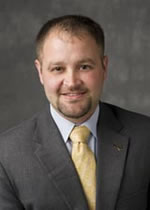 Agribusiness leaders nationwide can use results from a new Purdue study to help them become more successful by understanding their farmer customers better. The Large Commercial Producer Survey, conducted every five years by the Center for Food and Agricultural Business, explores the concerns, preferences, behaviors and attitudes of U.S. farmers and ranchers. This year's survey is based on results from nearly 1,700 producers. "Our goal is to help agricultural producers and agribusinesses reach higher levels of success," said Mike Gunderson, Agricultural Economics associate professor and associate director of research at the center. "Armed with information and insights about their farmer customers, agribusinesses can create new business strategies based on what their customers value." Started in 1998, the survey focuses on corn/soybean, wheat/barley, cotton, fruit/nut/vegetable, dairy, hog and cattle producers across the U.S. Agribusiness leaders nationwide can use results from a new Purdue study to help them become more successful by understanding their farmer customers better. The Large Commercial Producer Survey, conducted every five years by the Center for Food and Agricultural Business, explores the concerns, preferences, behaviors and attitudes of U.S. farmers and ranchers. This year's survey is based on results from nearly 1,700 producers. "Our goal is to help agricultural producers and agribusinesses reach higher levels of success," said Mike Gunderson, Agricultural Economics associate professor and associate director of research at the center. "Armed with information and insights about their farmer customers, agribusinesses can create new business strategies based on what their customers value." Started in 1998, the survey focuses on corn/soybean, wheat/barley, cotton, fruit/nut/vegetable, dairy, hog and cattle producers across the U.S.
Full story: http://www.purdue.edu/newsroom/releases/2014/Q2/purdue-study-reveals-farmers-buying-preferences,-concerns.html
Phage 'cocktail' wipes out 99 percent of E. coli in meat, spinach
 Treating food products with select bacteriophages - viruses that target and kill bacteria - could significantly reduce concentrations of E. coli, a study led by Paul Ebner, Animal Sciences associate professor, shows. An injection of bacteriophages - also known informally as "phages" - nearly eradicated a toxin-producing strain of E. coli in contaminated spinach and ground beef, in some cases decreasing E. coli concentrations by about 99 percent. The study suggests that bacteriophage treatment could be an effective tool to help ensure the safety of food products, Ebner said. "Phage treatment is a way of harnessing the natural antibacterial properties of phages to limit E. coli and other important foodborne pathogens," Ebner said. "Applying this kind of therapy to contaminated foods will make them safer." Treating food products with select bacteriophages - viruses that target and kill bacteria - could significantly reduce concentrations of E. coli, a study led by Paul Ebner, Animal Sciences associate professor, shows. An injection of bacteriophages - also known informally as "phages" - nearly eradicated a toxin-producing strain of E. coli in contaminated spinach and ground beef, in some cases decreasing E. coli concentrations by about 99 percent. The study suggests that bacteriophage treatment could be an effective tool to help ensure the safety of food products, Ebner said. "Phage treatment is a way of harnessing the natural antibacterial properties of phages to limit E. coli and other important foodborne pathogens," Ebner said. "Applying this kind of therapy to contaminated foods will make them safer."
Full story: http://www.purdue.edu/newsroom/releases/2014/Q2/phage-cocktail-wipes-out-99-percent-of-e.-coli-in-meat,-spinach.html
Seminar to discuss quality forages, quality meat for producers
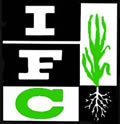 Forage and livestock producers who want to learn about the role forage quality plays in meat quality can attend the Indiana Forage Council seminar. This year's seminar, Quality Forage-Quality Meat, will be held in conjunction with the Indiana Forage Council annual meeting April 24 at The Beef House Restaurant, 16501 Indiana 63, Covington. "The use of forages for the production of products, such as meat, milk and wool, from ruminant livestock, can be cost-effective if the proper quality of forage is being fed to the right class of livestock," said Keith Johnson, Purdue Extension forage specialist. "We will emphasize the role quality forage plays in calf and lamb weight gains." Seminar speakers are Scott Royer of Royer Farm Fresh Beef, Lamb and Pork and Garret Miller of Hoosier Grassfed Beef. They will speak about how their businesses have succeeded in the production of meat for local and specialized markets. Forage and livestock producers who want to learn about the role forage quality plays in meat quality can attend the Indiana Forage Council seminar. This year's seminar, Quality Forage-Quality Meat, will be held in conjunction with the Indiana Forage Council annual meeting April 24 at The Beef House Restaurant, 16501 Indiana 63, Covington. "The use of forages for the production of products, such as meat, milk and wool, from ruminant livestock, can be cost-effective if the proper quality of forage is being fed to the right class of livestock," said Keith Johnson, Purdue Extension forage specialist. "We will emphasize the role quality forage plays in calf and lamb weight gains." Seminar speakers are Scott Royer of Royer Farm Fresh Beef, Lamb and Pork and Garret Miller of Hoosier Grassfed Beef. They will speak about how their businesses have succeeded in the production of meat for local and specialized markets.
Full story: http://www.purdue.edu/newsroom/releases/2014/Q2/seminar-to-discuss-quality-forages,-quality-meat-for-producers.html
Tymora Analytical Operations creates new line of products for cancer research
 Cancer researchers in educational and commercial settings have two new tools from a Purdue Research Park-based company to help them with target detection and discovery of novel drugs to fight the disease. Tymora Analytical Operations LLC has developed two products that could advance the testing of cancer drugs and general research objectives based on one of its technology platforms. Anton Iliuk, president and chief technology officer, said the pIMAGO product line has new applications that work with two of the most widely used techniques to detect and quantify proteins and their modifications: Western blot and ELISA. "pIMAGO detects phosphorylation, which is the process to add a phosphate group to a protein. Phosphorylation is related to the development of several cancers and usually marks the onset of a disease," he said. "Our new line of products based on the pIMAGO platform now works with the Western blot and ELISA systems." Tymora Analytical Operations commercializes work by W. Andy Tao, associate professor in the Department of Biochemistry. Cancer researchers in educational and commercial settings have two new tools from a Purdue Research Park-based company to help them with target detection and discovery of novel drugs to fight the disease. Tymora Analytical Operations LLC has developed two products that could advance the testing of cancer drugs and general research objectives based on one of its technology platforms. Anton Iliuk, president and chief technology officer, said the pIMAGO product line has new applications that work with two of the most widely used techniques to detect and quantify proteins and their modifications: Western blot and ELISA. "pIMAGO detects phosphorylation, which is the process to add a phosphate group to a protein. Phosphorylation is related to the development of several cancers and usually marks the onset of a disease," he said. "Our new line of products based on the pIMAGO platform now works with the Western blot and ELISA systems." Tymora Analytical Operations commercializes work by W. Andy Tao, associate professor in the Department of Biochemistry.
Full story: http://www.purdue.edu/newsroom/releases/2014/Q2/tymora-analytical-operations-creates-new-line-of-products-for-cancer-research.html
Purdue ag economist: Baby pig losses were greatest in winter months
 The impact of the PED virus in swine was felt most strongly during the unusually harsh winter months of December through February, said Purdue University agricultural economist Chris Hurt. He said this means the losses of baby pigs probably will decrease as the weather warms this spring. Hurt said the U.S. Department of Agriculture's report showing how much the nation's inventory of market hogs decreased in the past six months was perhaps the most anticipated report for the pork industry in decades. It was the industry's first opportunity to get a national, comprehensive measure of the baby pig losses since porcine epidemic diarrhea virus was first identified in the spring of 2013. PED is a virus of swine that is fatal to nearly all infected piglets less than 2 weeks old. There is no vaccination or treatment. Health experts say the virus causes no harm to humans and is not a threat to food safety. The impact of the PED virus in swine was felt most strongly during the unusually harsh winter months of December through February, said Purdue University agricultural economist Chris Hurt. He said this means the losses of baby pigs probably will decrease as the weather warms this spring. Hurt said the U.S. Department of Agriculture's report showing how much the nation's inventory of market hogs decreased in the past six months was perhaps the most anticipated report for the pork industry in decades. It was the industry's first opportunity to get a national, comprehensive measure of the baby pig losses since porcine epidemic diarrhea virus was first identified in the spring of 2013. PED is a virus of swine that is fatal to nearly all infected piglets less than 2 weeks old. There is no vaccination or treatment. Health experts say the virus causes no harm to humans and is not a threat to food safety.
Full story: http://www.purdue.edu/newsroom/releases/2014/Q1/purdue-ag-economist-baby-pig-losses-were-greatest-in-winter-months.html
Purdue researchers launch two new farm decision tools
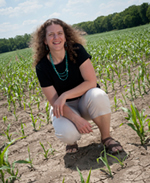 A group of Purdue University researchers has led the Useful to Usable climate initiative in launching two free online tools to help farmers make crop decisions in variable weather conditions. Useful to Usable, or U2U, aims to improve profitability and longevity of U.S. farms amid a variable and changing climate. The project, funded by the U.S. Department of Agriculture's National Institute of Food and Agriculture, is composed of a team of 50 faculty, staff and students from nine universities who specialize in applied climatology, crop modeling, agronomy, cyber technology, agricultural economics and other social sciences. Linda Prokopy, associate professor of forestry and natural resources at Purdue, leads the team. Other Purdue team members are agricultural economists Otto Doering and Ben Gramig; Indiana State Climatologist Dev Niyogi; Carol Song, director of scientific solutions for Information Technology at Purdue; and U2U project manager Melissa Widhalm. A group of Purdue University researchers has led the Useful to Usable climate initiative in launching two free online tools to help farmers make crop decisions in variable weather conditions. Useful to Usable, or U2U, aims to improve profitability and longevity of U.S. farms amid a variable and changing climate. The project, funded by the U.S. Department of Agriculture's National Institute of Food and Agriculture, is composed of a team of 50 faculty, staff and students from nine universities who specialize in applied climatology, crop modeling, agronomy, cyber technology, agricultural economics and other social sciences. Linda Prokopy, associate professor of forestry and natural resources at Purdue, leads the team. Other Purdue team members are agricultural economists Otto Doering and Ben Gramig; Indiana State Climatologist Dev Niyogi; Carol Song, director of scientific solutions for Information Technology at Purdue; and U2U project manager Melissa Widhalm.
Full story: http://www.purdue.edu/newsroom/releases/2014/Q1/purdue-researchers-launch-two-new-farm-decision-tools.html
Purdue educator: EAB can survive harsh winter in most places
 This winter was a brutal one, for sure, but the emerald ash borer still has plenty of life left in it. Although the Midwest experienced abnormally cold temperatures this winter, it is unlikely that populations of the highly destructive beetle were significantly affected by it, said Adam Witte, exotic forest pest educator in the Department of Entomology. "Headlines have been circulating suggesting that EAB may have met its match," Witte said. "But the EAB, as well as most insects in colder climates, is effective at surviving cold temperatures." This winter was a brutal one, for sure, but the emerald ash borer still has plenty of life left in it. Although the Midwest experienced abnormally cold temperatures this winter, it is unlikely that populations of the highly destructive beetle were significantly affected by it, said Adam Witte, exotic forest pest educator in the Department of Entomology. "Headlines have been circulating suggesting that EAB may have met its match," Witte said. "But the EAB, as well as most insects in colder climates, is effective at surviving cold temperatures."
Full story: http://www.purdue.edu/newsroom/releases/2014/Q1/purdue-educator-eab-can-survive-harsh-winter-in-most-places.html
Indiana regulator seeking federal approval for industrial hemp
 The Indiana seed commissioner is seeking approval from the federal government to allow production of industrial hemp in Indiana under regulations enacted by the state Legislature. Until such authority is given - a process that could take several months - no one can legally grow industrial hemp in Indiana, Robert Waltz, head of the Office of the Indiana State Chemist and Seed Commissioner, based at Purdue, said. Even then, growers and handlers would need a license and be required to comply with stringent state regulations. "It could be quite some time before we see any legal production of hemp in Indiana," said Waltz, who will administer the regulations. The law initially will enable universities in Indiana to conduct research into potential uses of industrial hemp. State lawmakers enacted the law during this year's legislative session because the new U.S. farm bill that Congress passed in February includes a provision allowing universities or state departments of agriculture to conduct such research provided that state law permits it and that the activity complies with federal laws. The Indiana seed commissioner is seeking approval from the federal government to allow production of industrial hemp in Indiana under regulations enacted by the state Legislature. Until such authority is given - a process that could take several months - no one can legally grow industrial hemp in Indiana, Robert Waltz, head of the Office of the Indiana State Chemist and Seed Commissioner, based at Purdue, said. Even then, growers and handlers would need a license and be required to comply with stringent state regulations. "It could be quite some time before we see any legal production of hemp in Indiana," said Waltz, who will administer the regulations. The law initially will enable universities in Indiana to conduct research into potential uses of industrial hemp. State lawmakers enacted the law during this year's legislative session because the new U.S. farm bill that Congress passed in February includes a provision allowing universities or state departments of agriculture to conduct such research provided that state law permits it and that the activity complies with federal laws.
Full story: http://www.purdue.edu/newsroom/releases/2014/Q2/indiana-regulator-seeking-federal-approval-for-industrial-hemp.html
|
|
University News
Provost finalists to make on-campus presentations
Three finalists for Purdue University provost will be on campus for two-day interviews this month, the search committee announced Monday (April 7). Finalists will meet with various groups and make public presentations to the university community on April 14-15, April 16-17 and April 21-22. Tim Zwier, interim head of the Department of Chemistry and chair of the search committee, said as part of the process finalists will make a 30-minute public presentation and then take questions from those in attendance. Feedback on the candidates is requested, and an online tool will be provided on the provost candidate website at http://www.purdue.edu/provost/search. The candidates' full curriculum vitae are available at http://www.purdue.edu/provost/search.
Full story: http://www.purdue.edu/newsroom/releases/2014/Q2/provost-finalists-to-make-on-campus-presentations.html
Purdue's first-ever Day of Giving set for April 30
Purdue University has set aside April 30 to celebrate its first-ever Day of Giving, encouraging students, faculty, staff, alumni, donors and friends from all campuses to contribute to the university. The Purdue Day of Giving, a 24-hour, online event, will focus on student affordability and accessibility, among other areas, and will feature Web-based social media components to engage donors. The day's theme is "Opportunity Granted." "Purdue is known for producing graduates who launch dreams and achieve greatness," said President Mitch Daniels. "Our goal with the Day of Giving is to bring together the Purdue family to make that opportunity more affordable for more students."
Full story: http://www.purdue.edu/newsroom/releases/2014/Q1/purdues-first-ever-day-of-giving-set-for-april-30.html
New Discovery Park research center to focus on open digital innovation efforts
A new Discovery Park center affiliated with the Burton D. Morgan Center for Entrepreneurship will focus on equipping future systems designers, managers and leaders with new guidelines and database tools to solve complex problems in areas such as health care, regional development, financial services and smart manufacturing. The Research Center for Open Digital Innovation at Purdue, led by technology and innovation professor Sabine Brunswicker, will build on the university's strengths in computational systems and modeling, technology, engineering, the sciences and entrepreneurship to advance research and offer research-based interdisciplinary graduate education in innovation.
Full story: http://www.purdue.edu/newsroom/releases/2014/Q2/new-discovery-park-research-center-will-focus-on-open-digital-innovation-efforts.html
Diversity and Inclusion program guide offered online
The Division of Diversity and Inclusion's Spring 2014 Diversity and Inclusion Program Guide is now online. The guide, which offers a comprehensive listing of the division's programs and services, is available at www.purdue.edu/diversity-inclusion/program-guide.
|
|
|
|
|
 In an interview I did recently with a member of the agricultural press, the reporter wanted to talk about funding for agricultural research. One of the questions she asked was “why is agricultural research important in Indiana?” Of course, I believe agricultural research is of fundamental importance to our state, but a basic question like this one forced me to think about some of the specific reasons why that is true. Let me offer a few thoughts in this month’s column.
In an interview I did recently with a member of the agricultural press, the reporter wanted to talk about funding for agricultural research. One of the questions she asked was “why is agricultural research important in Indiana?” Of course, I believe agricultural research is of fundamental importance to our state, but a basic question like this one forced me to think about some of the specific reasons why that is true. Let me offer a few thoughts in this month’s column.

 The Graduate Research Spotlight highlights graduate students and their work. This month’s spotlight is on Celina Gomez Vargas, Horticulture; advisor Cary Mitchell.
The Graduate Research Spotlight highlights graduate students and their work. This month’s spotlight is on Celina Gomez Vargas, Horticulture; advisor Cary Mitchell. A group of Purdue University students who created a soy-based, renewable and recyclable filament for 3D printing won the top prize in the annual
A group of Purdue University students who created a soy-based, renewable and recyclable filament for 3D printing won the top prize in the annual  Faculty, staff and students are invited to join us for the Spring 2014 Learning from Leaders talk presented by Michele Payn-Knoper on Tuesday, April 15 at 6:00 pm in the Pfendler Hall Deans Auditorium. Michele Payn-Knoper, CSP, connects farm gate to food plate to your fork as principal of Cause Matters Corp. She is known for being a community catalyst and a passionate advocate for overcoming food misinformation—and for antagonizing people into action. Michele has worked in more than25 countries and raised more than $5 million in sponsorships for the National FFA Foundation. She is the founder of the weekly online Twitter conversations AgChat and FoodChat, which have involved more than 15,000 participants since April 2009. Payn-Knoper has earned the Certified Speaking Professional (CSP) designation, awarded to less than 10% of professional speakers globally. She holds degrees in animal science and agricultural communications from Michigan State University. She resides with her daughter in rural Indiana where they garden, cook, and enjoy fun with friends. Michele serves as a resource to connect conversations around the food plate at
Faculty, staff and students are invited to join us for the Spring 2014 Learning from Leaders talk presented by Michele Payn-Knoper on Tuesday, April 15 at 6:00 pm in the Pfendler Hall Deans Auditorium. Michele Payn-Knoper, CSP, connects farm gate to food plate to your fork as principal of Cause Matters Corp. She is known for being a community catalyst and a passionate advocate for overcoming food misinformation—and for antagonizing people into action. Michele has worked in more than25 countries and raised more than $5 million in sponsorships for the National FFA Foundation. She is the founder of the weekly online Twitter conversations AgChat and FoodChat, which have involved more than 15,000 participants since April 2009. Payn-Knoper has earned the Certified Speaking Professional (CSP) designation, awarded to less than 10% of professional speakers globally. She holds degrees in animal science and agricultural communications from Michigan State University. She resides with her daughter in rural Indiana where they garden, cook, and enjoy fun with friends. Michele serves as a resource to connect conversations around the food plate at  Three Agriculture faculty members have been selected as University Faculty Scholars for 2014:
Three Agriculture faculty members have been selected as University Faculty Scholars for 2014: 




 Emily Erickson, a junior majoring in biochemistry, is one of four Purdue students who have received Barry Goldwater Scholarships. The scholarship provides up to $7,500 toward tuition, fees, room and board. Congress established it in 1986 to provide a continuing source of highly qualified scientists, mathematicians and engineers by awarding scholarships to sophomores and juniors who intend to pursue research careers. Students studying in the science, engineering and mathematics fields are eligible. Congratulations also go to Sherry Pogranichniy, undergraduate program administrator in Biochemistry, whose son was also awarded a Goldwater Scholarship.
Emily Erickson, a junior majoring in biochemistry, is one of four Purdue students who have received Barry Goldwater Scholarships. The scholarship provides up to $7,500 toward tuition, fees, room and board. Congress established it in 1986 to provide a continuing source of highly qualified scientists, mathematicians and engineers by awarding scholarships to sophomores and juniors who intend to pursue research careers. Students studying in the science, engineering and mathematics fields are eligible. Congratulations also go to Sherry Pogranichniy, undergraduate program administrator in Biochemistry, whose son was also awarded a Goldwater Scholarship. For the second year in a row, a team from Purdue University won a statewide business plan competition for clean energy startups and will compete in a regional competition in Chicago. Spero Energy Inc. won the Indiana Clean Energy Challenge in February and competed in the
For the second year in a row, a team from Purdue University won a statewide business plan competition for clean energy startups and will compete in a regional competition in Chicago. Spero Energy Inc. won the Indiana Clean Energy Challenge in February and competed in the  Genetically modifying a key protein complex in plants could lead to improved crops for the production of cellulosic biofuels, according to a study led by
Genetically modifying a key protein complex in plants could lead to improved crops for the production of cellulosic biofuels, according to a study led by  Areas where landscape shifts from urban to rural or forest to farmland may have a higher likelihood of severe weather and tornado touchdowns, a Purdue University study says. An examination of more than 60 years of Indiana tornado climatology data from the National Weather Service's Storm Prediction Center showed that a majority of tornado touchdowns occurred near areas where dramatically different landscapes meet - for example, where a city fades into farmland or a forest meets a plain. Forecasters and city planners may need to pay closer attention to these "transition zones" to better understand tornado risks, said Olivia Kellner, doctoral student in the Department of Earth, Atmospheric and Planetary Sciences and first author of the study.
Areas where landscape shifts from urban to rural or forest to farmland may have a higher likelihood of severe weather and tornado touchdowns, a Purdue University study says. An examination of more than 60 years of Indiana tornado climatology data from the National Weather Service's Storm Prediction Center showed that a majority of tornado touchdowns occurred near areas where dramatically different landscapes meet - for example, where a city fades into farmland or a forest meets a plain. Forecasters and city planners may need to pay closer attention to these "transition zones" to better understand tornado risks, said Olivia Kellner, doctoral student in the Department of Earth, Atmospheric and Planetary Sciences and first author of the study.  Agribusiness leaders nationwide can use results from a new Purdue study to help them become more successful by understanding their farmer customers better. The
Agribusiness leaders nationwide can use results from a new Purdue study to help them become more successful by understanding their farmer customers better. The  Treating food products with select bacteriophages - viruses that target and kill bacteria - could significantly reduce concentrations of E. coli, a study led by
Treating food products with select bacteriophages - viruses that target and kill bacteria - could significantly reduce concentrations of E. coli, a study led by  Forage and livestock producers who want to learn about the role forage quality plays in meat quality can attend the Indiana Forage Council seminar. This year's seminar, Quality Forage-Quality Meat, will be held in conjunction with the
Forage and livestock producers who want to learn about the role forage quality plays in meat quality can attend the Indiana Forage Council seminar. This year's seminar, Quality Forage-Quality Meat, will be held in conjunction with the  The impact of the PED virus in swine was felt most strongly during the unusually harsh winter months of December through February, said Purdue University agricultural economist
The impact of the PED virus in swine was felt most strongly during the unusually harsh winter months of December through February, said Purdue University agricultural economist  A group of Purdue University researchers has led the Useful to Usable climate initiative in launching two free online tools to help farmers make crop decisions in variable weather conditions.
A group of Purdue University researchers has led the Useful to Usable climate initiative in launching two free online tools to help farmers make crop decisions in variable weather conditions.  This winter was a brutal one, for sure, but the emerald ash borer still has plenty of life left in it. Although the Midwest experienced abnormally cold temperatures this winter, it is unlikely that populations of the highly destructive beetle were significantly affected by it, said Adam Witte, exotic forest pest educator in the
This winter was a brutal one, for sure, but the emerald ash borer still has plenty of life left in it. Although the Midwest experienced abnormally cold temperatures this winter, it is unlikely that populations of the highly destructive beetle were significantly affected by it, said Adam Witte, exotic forest pest educator in the  The Indiana seed commissioner is seeking approval from the federal government to allow production of industrial hemp in Indiana under regulations enacted by the state Legislature. Until such authority is given - a process that could take several months - no one can legally grow industrial hemp in Indiana, Robert Waltz, head of the
The Indiana seed commissioner is seeking approval from the federal government to allow production of industrial hemp in Indiana under regulations enacted by the state Legislature. Until such authority is given - a process that could take several months - no one can legally grow industrial hemp in Indiana, Robert Waltz, head of the  Purdue University is a community where diversity is valued and incidents of hate and bias are not tolerated. Students, faculty, staff, and campus visitors who feel that they have been the victim of a bias related incident (or who have witnessed a bias related incident) are encouraged to report it online at
Purdue University is a community where diversity is valued and incidents of hate and bias are not tolerated. Students, faculty, staff, and campus visitors who feel that they have been the victim of a bias related incident (or who have witnessed a bias related incident) are encouraged to report it online at